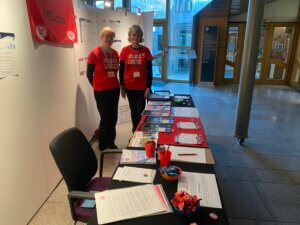The U.S. Chronic Fatigue Advisory Committee (CFSAC) is looking to fill six vacant positions as voting members:
- One position for patients or caregivers affected by ME/CFS
- One position for an individual with expertise in health care delivery, private health care services or insurers, or voluntary organizations concerned with the problems of individuals with ME/CFS
- Four positions for biomedical research scientists with demonstrated expertise in biomedical research applicable to ME/CFS
CFSAC meets twice yearly and provides advice and recommendations to the Secretary of Health and Human Services (HHS) on issues related to myalgic encephalomyelitis/chronic fatigue syndrome (ME/CFS).
If you are interested in applying for this CFSAC position and would like assistance, email [email protected].
What does the patient/caregiver role entail?
The position involves attendance at two 2-day meetings per year, generally one in person and one via phone/webinar. Apart from the meetings, members also spend time reviewing ex-officio reports, written public comments, special presentations, meeting minutes, etc., in preparation of the meetings.
Members also voluntarily participate in special Work Groups that tend to meet briefly every month and often break down into subgroups that work on specific issues related to the Work Group’s broader purpose. Most of a member’s time may be spent researching, preparing, and presenting information to be incorporated into recommendations at the CFSAC meetings.
Some additional time is needed for miscellaneous meeting follow-up, research, and email communication with other members.
Disclosures / government protocol
When you serve on the committee as a voting member, you are being hired by the federal government as a “special government employee.” Therefore, you must spend time completing annual paperwork to disclose investments and sources of income ( to identify potential conflicts of interest), and you also must participate in annual Ethics Training.
The most common things HHS looks for are financial interests (stocks, investment funds, pension plans) that could be impacted by the member’s work on the committee, as well his/her employment and other positions they have. In some cases, HHS may ask them to divest certain holdings, recuse from working on matters that may affect their financial interests, or in some instances, issue a (b)(3) waiver. There are also regulatory exemptions for some issues, such as conflicts arising out of employment with a non-federal entity. This is common for members serving on a FACA committee. In nearly all cases, HHS is able to find a way to mitigate any conflicts that arise.
CFSAC work mostly on issues considered broad policy matters or matters of general applicability. A particular matter of general applicability is one which does not focus on specific parties, but instead would have an impact on a discrete and identifiable class of persons. HHS encourages participation from people who are experts in this area, and some level of conflicts is inevitable.
Learn more about CFSAC.






5 thoughts on “CFS Advisory Committee Seeks Voting Members”
I would love to be considered for the patient role. As an “employee”, will there be compensation that would affect my SSI and Medicaid eligibility? I can’t risk losing Medicaid.
I don’t believe that there is compensation. Please email [email protected] for more information.
I am interested in taking part but I live in the UK. Is the position open to people outside the US?
Thanks, Karen, for your interest but this position is only open to people in the United States since this committee is a federal advisory committee.
I am functional with ME but it would still be very stressful making a trip to DC, working groups would do me in for weeks recovery neuro-cognitively, and it is always a risk at ratcheting down another notch. How can a real ME patient really participate in person? It would be someone either recovered or high-functioning.. a dozen very representative ME sufferers via livestream might be more potent.. I would love to be the one to communicate this illness being a researcher and dedicated experimenter to find more solutions, which I have already found so much more than any medical doctor has in almost a decade. Patients ought to have a way to download observations and what works. For example I have found light therapy to be one of the most helpful, also thc and cbd, also NADH.. and many more. If researchers listened to the most observant patients it may help speed the resolution. Glad something is happening!
Comments are closed.